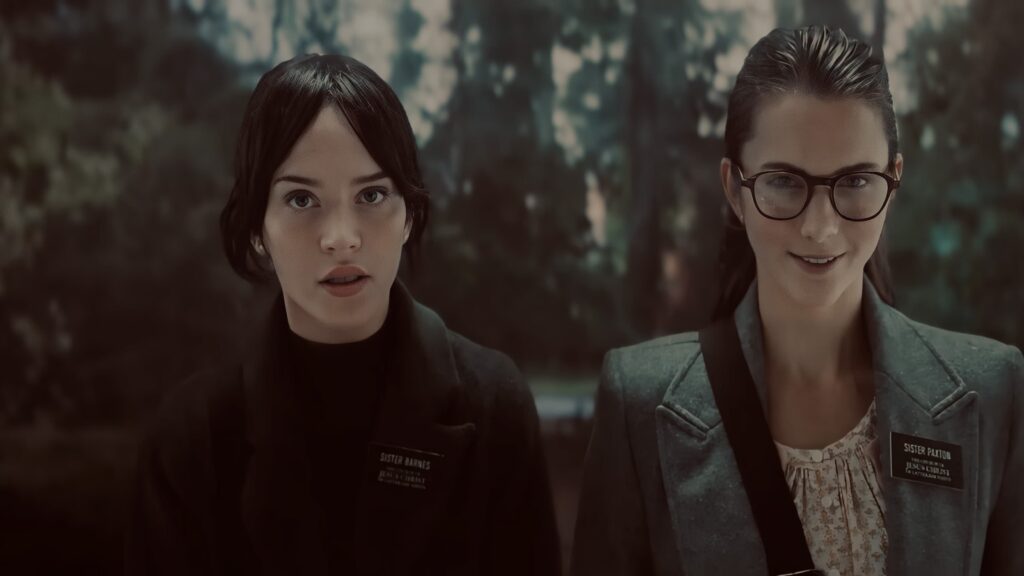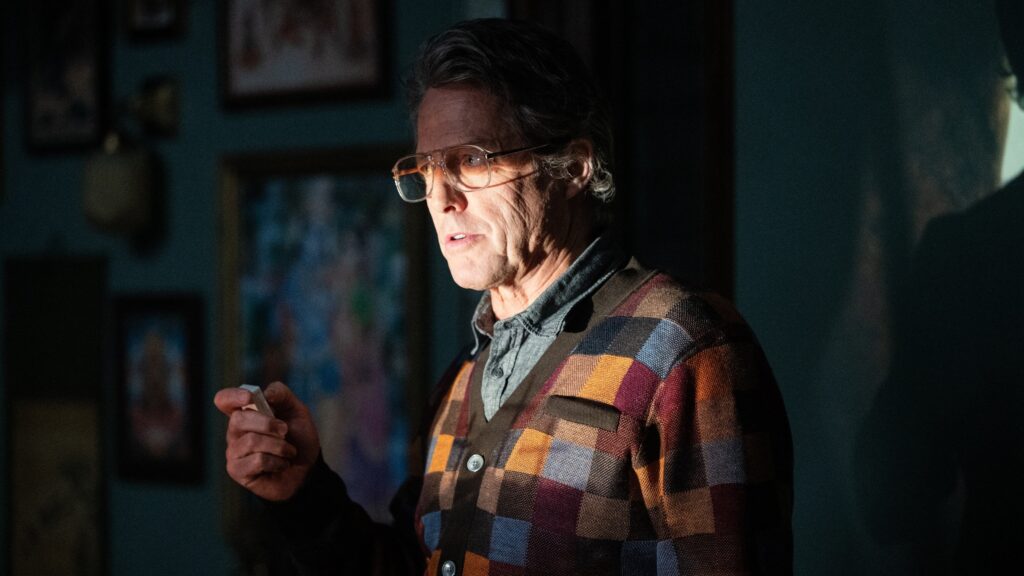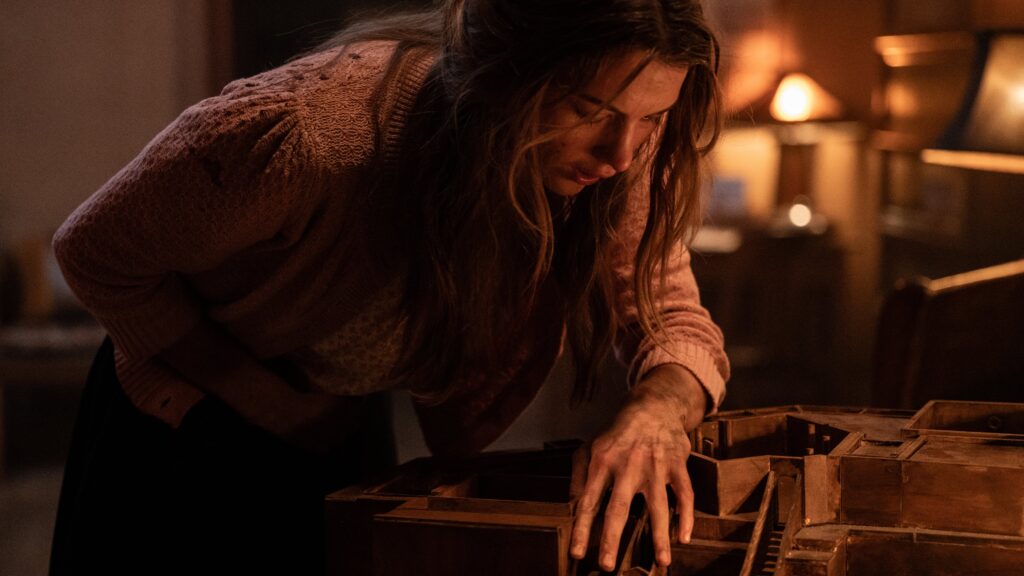I don't care if it hurts, I wanna have control
I am very, very mixed on Heretic. The A24 release has become one of the buzziest horror films of 2024, but it’s one of those indie horror releases — or can we even call A24 indie anymore? — where I kinda understand the hype but I just don’t feel it, like Barbarian from 2022. (And also like Barbarian… well, spoiler, but look out for what’s in a basement.) Scott Beck and Bryan Woods wrote, directed, and produced the film. The pair also created, ugh, 65, but are perhaps most famous as the writers of A Quiet Place, which is one of the biggest horror movies of the past decade and one I still haven’t seen.
The story follows two Mormon missionaries, Sister Barnes (Sophie Thatcher) and Paxton (Chloe East), going door to door spreading their faith. One rainy evening, they knock on the door of a potential convertee, Mr. Reed (Hugh Grant). The middle-aged man seems genial, but the encounter gradually turns stranger and more unsettling. And, heck, you probably saw the genre listed as horror and Hugh Grant’s sinister face on the poster, so you know the approximate direction this is headed. That logline alone takes us well into the second half of the movie, practically to the ending. Heretic is one of those tight films that is just its initial scenario unfolding to its resolution.
Heretic succeeds in some areas that are uncommon for pop horror films. It is surprisingly non-stupid and ambivalent about religion (“smart” would be too generous). That goes beyond the much-reported and accurate claim that the Mormons are not the silly cartoons that Hollywood usually traffics in, but portrayed as real people with some specificity in their customs, or at least the protocol of their proselytizing. No, it goes beyond that: The entire, escalating scenario cleverly allows the characters to engage with some of the most basic and profound questions that religion tries to answer, but in heightened, physical ways. The film points out in both dialogue but in plot action the dangers of being blindly faithful and trusting, but also of succumbing to pseudo-intellectualism as “proof” of atheism and rationalization for anti-religious zeal. More than one review I’ve read has suggested the film is “atheist,” but I don’t think that’s true. Some points that Reed makes that he thinks are “gotchas” are outright wrong, and Sister Barnes even calls him on a couple of them, so Beck and Woods are clearly hedging a little.

By contrast, I don’t know for sure whether Beck and Woods intend that the audience knows that some analogies Reed uses are bunk. (Warning: the rest of this paragraph has nothing to do with the movie itself.) The prominent placement of Radiohead’s “Creep” and fellow ten-out-of-ten track “The Air that I Breathe” by The Hollies that he holds up as an example that culture and concepts we revere just being photocopies of older ideas is particularly goofy. What makes “Creep” so powerful is not strictly the melody or the chord progression, but the angsty self-loathing and helpless longing that music fuels, exploding into that “she run run run” bridge. Meanwhile, Monopoly didn’t just steal and profit off of The Landlords Game. It entirely subverted it: the original design by Elizabeth Magie was a bit of leftist, Georgism propaganda, showing how accumulation of wealth via land ownership inevitably results in poverty for the masses. Charles Darrow said, “ooh that sounds neat,” and made hundreds of millions of dollars off of a slightly redesigned version where the thrill of building wealth and bankrupting foes is the selling point.
Anyway, I appreciated the film’s handling of religion, at least through the film’s first half. But plenty of the writing baffled me. The film opens with a conversation about sex and penis size, and one of the film’s turning points is identification of a birth control device, but both scenes seem like they come from earlier, more depraved drafts of the script. (The latter scene is half-baked and has little bearing on the rest of the story.) In Heretic’s current form, sex (and fear of sex) is reduced to subtext for most of the duration. To be fair, it is, at least, prominent subtext: male domination of women is a very steady undercurrent of the story from start to finish.
Last major kudos to Beck and Woods: The movie works very hard to avoid being subject to a dumb-dumb plot. What I mean is that Heretic circumvents “well why didn’t they just…” questions by giving us an antagonist who has so thoroughly prepared that it would be impossible for Sisters Paxton and Barnes to avoid trouble after their first, fairly reasonable, mistakes. Mostly it boils down to a timed-lock front door with a well-hidden key, but you can’t say “just run away, idiots!” because they do try to run away multiple times, and it never works.
Notice that I have couched most of my praise with some variation of the clause “for the film’s first half.” Heretic falls apart the further the runtime goes, and plummets at the same time its two Sisters make a descent of their own. In fact, it’s partially the flip side of my previous point: As the extent of Reed’s manipulations becomes clearer and grander, the film shifts from being a tense battle of wills and subtle threats to a jigsaw torture trap constructed by a supervillain. Heretic becomes less interesting the more unhinged and sociopathic Reed becomes.

The ideas fall apart pretty heavily in the second half, too. The illusion of being a “cerebral” horror film shatters. Some ideas of resurrection and simulation theory are lazily tossed around in dialogue but have no consequence. The Sisters decide that the way to “win” the encounter — i.e. to survive — is to challenge Reed on his claims, as if this story is still a big metaphor for a spiritual debate between skeptic and believer, which I think is the idea that Beck and Woods are going for. But, truthfully, the story boils down to Barnes and Paxton figuring out how and when to shiv Reed and scramble for the exit.
The nuts and bolts of the film are pretty solid, but again tilted towards the first half. I enjoy the production of Reed’s house as a quaint cabin that grows more threatening by the minute. It borrows Hereditary’s idea of a mini-prop version of the house on prominent display for no obvious reason except it looks cool and provides thematic content. (Reed thinks he’s God… get it?) The editing is solid, maintaining tension and morbid fascination for the entire runtime with few lulls.
And importantly — in fact, pretty close to the lede if this review were organized by significance of the film’s strengths and weaknesses — the three performances are outstanding. Grant is getting the buzz both because he has the juiciest role and because he’s the famous name going against the type that he’s known for. But I think both Sophie Thatcher and Chloe East do outstanding work as the two protagonists, with East in particular balancing a character that’s slightly uneven on the page but very effective in practice: An innocent young Mormon woman whom her culture has conditioned to keep her savviness under the surface.
(Minor complaint: Heretic really isn’t the right word for the title. I was racking my brain trying to come up with it, and both Gavin and Hunter provided: Apostate.)

Sometimes I wish my review scale had a 4.5 “Inconclusive About Its Goodness” rating when I just can’t decide whether to give a film a soft thumbs up or thumbs down for films like this and Daddio and Strange World. Maybe someone as indecisive as me, as indecisive as Reed pretends to be about religion, shouldn’t be writing reviews. Anyway, Heretic has enough strengths to be worth watching and enough frustrating flaws to leave an unpleasant aftertaste.
Is It Good?
Nearly Good (4/8)
Dan is the founder and head critic of The Goods. Follow Dan on Letterboxd. Join the Discord for updates and discussion.


4 replies on “Heretic (2024)”
Maybe someone as indecisive as me, as indecisive as Reed pretends to be about religion, shouldn’t be writing reviews”
I think overenthusiasm for committing to a “definitive opinion” is much worse than forebearance. Heretic is also a very mixed bag. (Though maybe not mixed enough: I will say that if it’s crappy half were the front half, or if I couldn’t say “crappy half” in the first place–if it’s crappiness were well-mixed, that is–I personally would have had a much harder time deciding if it’s good or not. That pretty much the *entire* last half-hour-up-to-fifty-minutes is below par makes that determination easier. But hell, if the basement were even as interestingly production-designed as the living spaces, it’d be harder.)
“Heathen” would also possibly work. I wouldn’t mind hearing some Bowie on this soundtrack.
I’m in just about exactly the same spot. It could have been a heady, cerebral theological thriller, and it works in that mode for juuust long enough to be disappointed when it starts falling back on torture porn tropes.
I’m torn: this seems to be a movie with murders, but is it a “Hidey-ho murderinos!” sort of murder movie?
Anyway, I was actually popping in to say that I had seen and watched IF (2024) and that I’m happy to recommend it as a film with it’s heart firmly in the right place even when the script loses the plot & refuses to ask for directions.
Fair warning: after a decent strong opening some of the early scenes let the film down – but please don’t drop the film until you meet the Teddy Bear, as the first sequence will offer you a far better idea of what sort of movie this is.
I’d had IF on my skip list, but based on this rec I’ll bump it up to “maybe” 🙂